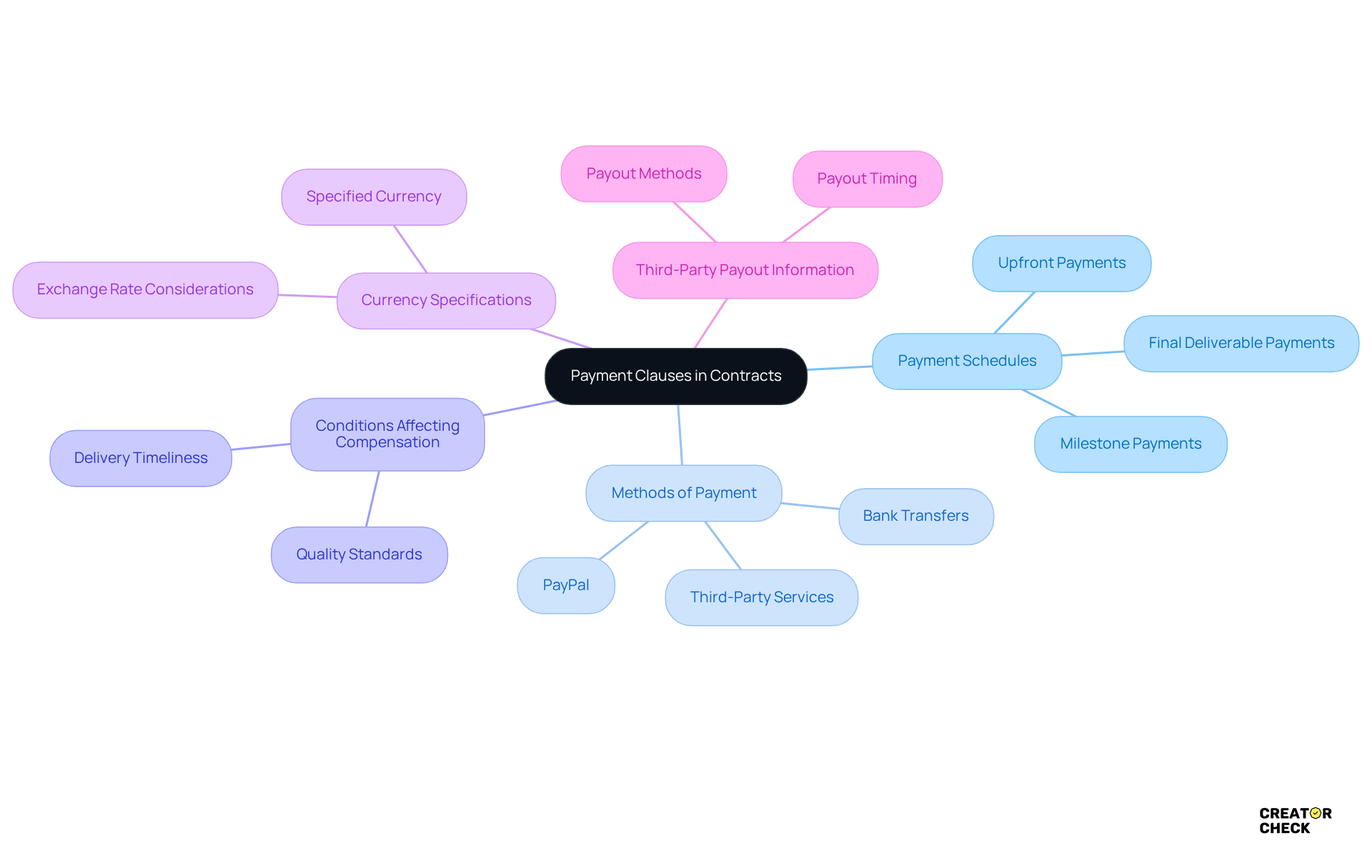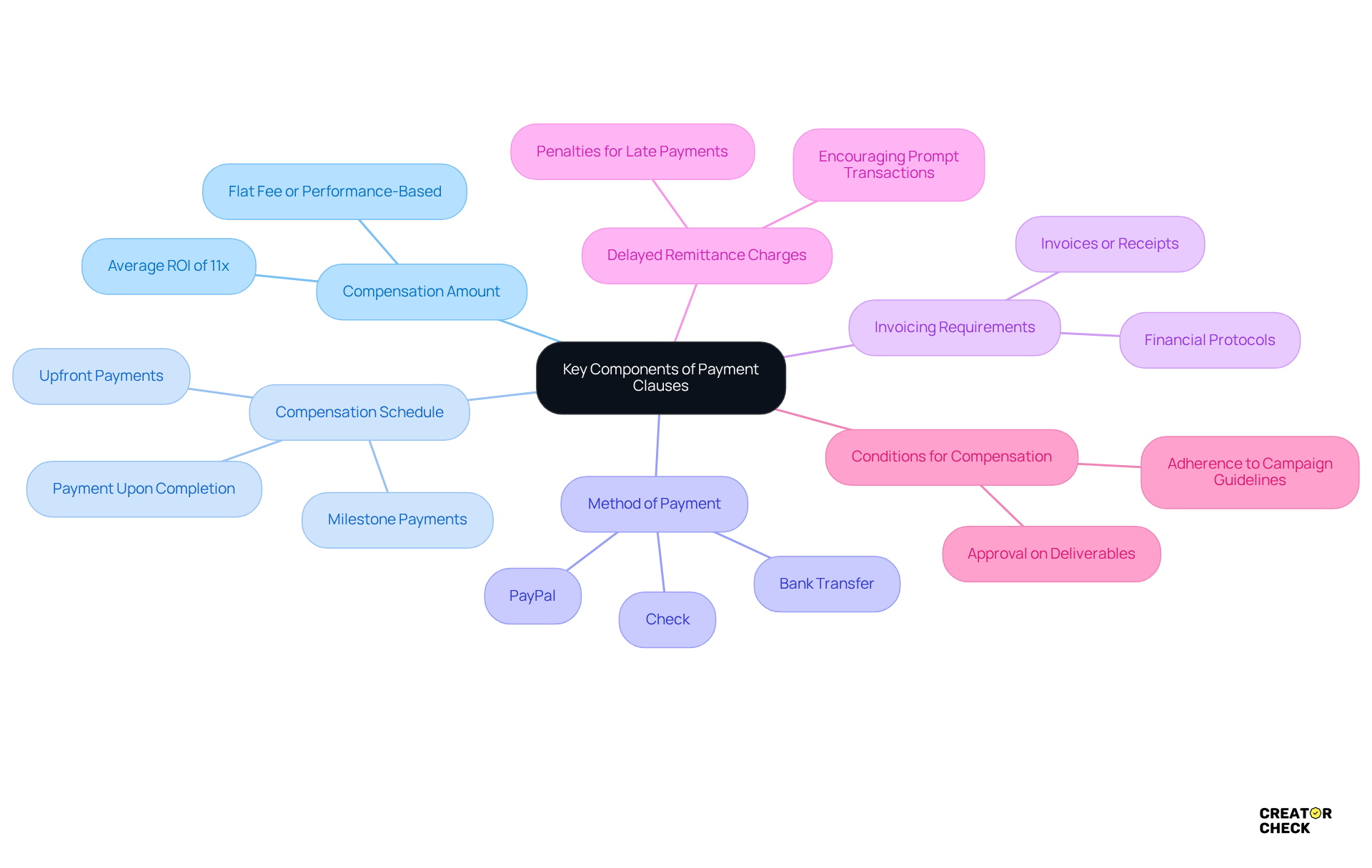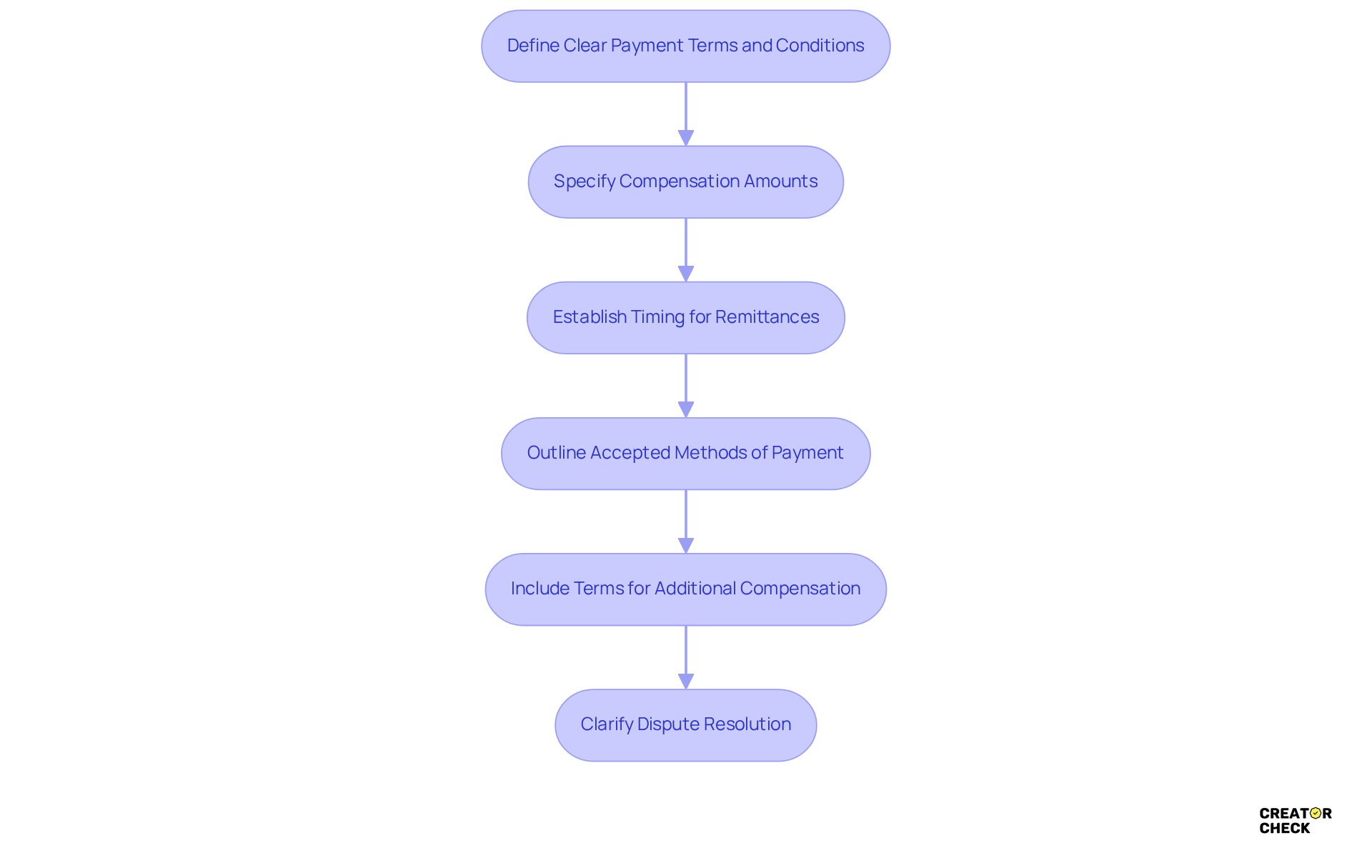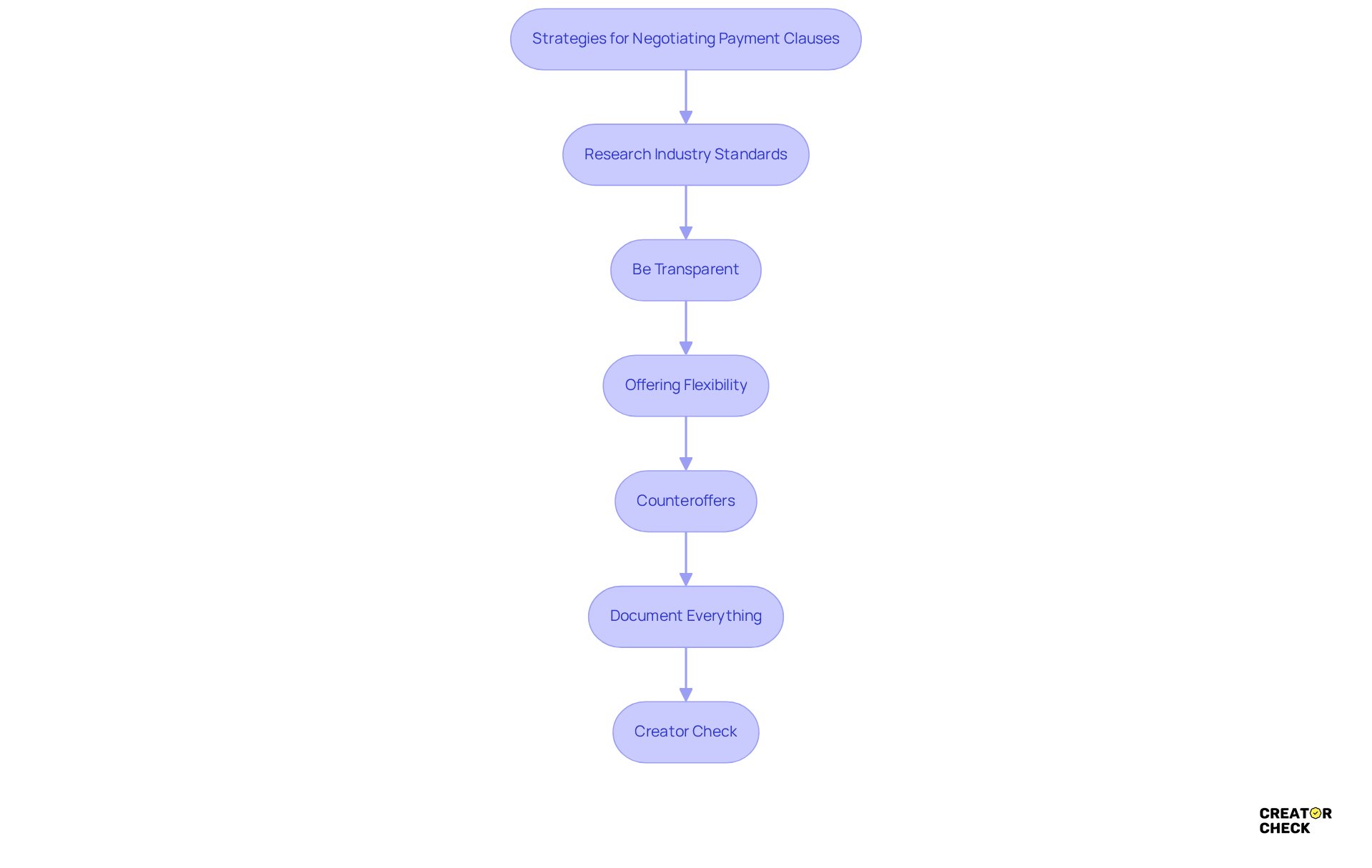Overview
When it comes to drafting payment clauses for influencer contracts, it’s all about being clear on:
- Compensation amounts
- Payment schedules
- Methods
- Conditions
This helps ensure that everyone’s on the same page and builds trust between the parties involved. Think about it: well-defined financial terms can really help prevent misunderstandings and foster positive relationships. And you know what that leads to? More effective marketing campaigns! So, let’s keep this in mind as we navigate the world of influencer contracts.
Introduction
Understanding the ins and outs of payment clauses in influencer contracts is super important in today’s ever-changing marketing world. These clauses not only outline the financial responsibilities of everyone involved but also lay the groundwork for successful collaborations. By getting the hang of drafting clear and comprehensive payment terms, agencies can build trust and transparency, which leads to more effective campaigns.
But what happens when negotiations get tough, or expectations don’t quite match up? Let’s explore the key components and best practices for crafting these agreements, which can help pave the way for smoother transactions and stronger partnerships.
Understand Payment Clauses in Contracts
Financial terms in marketing agreements are super important for laying out the monetary responsibilities of everyone involved. These provisions spell out the influencer's pay, when they'll get it, and how it will happen, making sure everyone is on the same page about financial expectations. A well-crafted payment clause can cover a bunch of different aspects, like:
- Payment Schedules: Do payments happen upfront, at certain milestones, or only when all deliverables are done? Knowing this helps manage expectations and builds trust.
- Methods of Payment: It's vital to clearly outline how transactions will go down—whether it’s through bank transfers, PayPal, or something else. This kind of transparency is key for smooth sailing.
- Conditions Affecting Compensation: Don’t forget to include any quality standards for the deliverables that might impact payment. For instance, if the content doesn’t meet the agreed-upon criteria, it could delay payment.
- Currency Specifications: Make sure to specify the currency for transactions and discuss any potential exchange rate fluctuations to avoid any mix-ups.
- Third-Party Payout Information: If you’re using a third-party service for payments, it’s a good idea to include that in the agreement to clarify the timing and method.
These days, there’s a growing emphasis on understanding how to draft payment clauses to minimize conflicts in influencer marketing. As the industry changes, agencies are becoming more aware of the need for precise agreements that not only protect their interests but also nurture positive relationships with creators. Solid financial terms not only clarify what’s expected but also teach how to draft payment clauses that lay the groundwork for successful partnerships.
Industry experts have weighed in on the importance of these clauses. For example, Larry Milstein points out how crucial transparent financial terms are in sponsorship agreements to ensure successful collaborations. Agencies can avoid misunderstandings and cultivate a more harmonious working relationship with influencers by learning how to draft payment clauses that include clear compensation terms, ultimately leading to more effective campaigns. So, what does this mean for you? It’s all about creating a win-win situation that benefits everyone involved!

Identify Key Components of Payment Clauses
When you're drafting payment clauses in influencer contracts, it’s super important to include a few key components to ensure everything is clear and everyone’s on the same page:
- Compensation Amount: Make sure to clearly specify how much the creator will be paid for their services. This could be a flat fee or tied to performance metrics. Did you know that influencer marketing has shown an average return on investment (ROI) of 11 times compared to traditional advertising? This really highlights why clear compensation terms are so crucial.
- Compensation Schedule: It’s vital to lay out when payments will be made. This could mean upfront payments, milestone payments, or payment upon project completion. Having a clear timeline helps manage expectations and builds trust.
- Method of Payment: Don’t forget to indicate how you’ll handle transactions! Whether it’s a bank transfer, PayPal, or check, being clear about the preferred payment methods can really streamline the process.
- Invoicing Requirements: Specify what documentation the content creator needs to submit to get paid. This could include invoices or receipts, ensuring that everyone sticks to the financial protocols.
- Delayed Remittance Charges: It’s a good idea to include terms that outline penalties for late payments. This not only encourages prompt transactions but also protects the creator’s interests.
- Conditions for Compensation: Be sure to detail any prerequisites for releasing funds, like needing approval on deliverables or sticking to campaign guidelines. This helps ensure that both parties are aligned on what’s expected.
By understanding how to draft payment clauses and weaving these components into your contracts, agencies can create comprehensive financial agreements that not only protect their interests but also enhance the value of the influencer’s contributions. Plus, using platforms like Creator Check can simplify the transaction process with automated processing, making it easier to draft those transaction clauses. So, what does this mean for you? It’s all about building strong, clear agreements that benefit everyone involved!

Define Clear Payment Terms and Conditions
To define clear payment terms and conditions, let’s consider a few steps together:
-
Specify Compensation Amounts: It’s essential to clearly outline what the creator will be paid for their work. Ensure both parties understand how to draft payment clauses before signing the contract. This transparency not only fosters trust but also sets the stage for a successful partnership.
-
Establish Timing for Remittances: When will the funds be disbursed? A common structure is a 50/50 split, where 50% is paid upfront and the remaining 50% upon project completion. This method not only secures the influencer's commitment but also aligns expectations. According to industry standards, understanding how to draft payment clauses is essential for this widely accepted compensation structure, as it helps manage cash flow effectively.
-
Outline Accepted Methods of Payment: Clearly state which payment methods are acceptable to avoid any confusion. You might consider options like bank transfers, credit card transactions, or digital wallets such as PayPal. Each method has its pros and cons; for instance, while PayPal is super convenient for international transactions, it can come with high fees. On the other hand, bank transfers are secure but might take a bit longer. Choose the method that works best for both parties when determining how to draft payment clauses.
-
Include Terms for Additional Compensation: If it applies, outline any bonuses or extra compensation based on performance metrics, like engagement rates or sales generated. This can really motivate influencers to deliver high-quality content and lead to better campaign outcomes.
-
Clarify Dispute Resolution: It’s a good idea to incorporate a provision that specifies how any disagreements regarding compensation will be handled, such as through mediation or arbitration. This gives both parties a clear path to resolution, minimizing potential conflicts and maintaining a professional relationship, especially when they understand how to draft payment clauses. Plus, keeping clear records of invoices, contracts, and confirmation of funds is crucial for tax reasons and can help settle disagreements if they arise, as expert Aishwarya Taskar points out.

Navigate Negotiation Challenges in Payment Clauses
Negotiating can be tricky, especially when it comes to how to draft payment clauses, but don’t worry—there are effective strategies to navigate these challenges successfully!
So, let’s kick things off with some research.
- Research Industry Standards: Before you dive into negotiations, take some time to learn about common payment rates and terms in the marketing world. This knowledge will help align your expectations with industry norms, making discussions smoother. Did you know that, on average, businesses earn $6.50 for every $1 they invest in marketing through social media personalities? It really highlights the importance of having solid negotiation strategies in place!
Next up,
- Be Transparent: Don’t hesitate to share your budget limitations and expectations with the content creator. Being open fosters trust and can lead to more productive negotiations since both parties will understand each other’s limitations and goals. Experts say that adaptability and informed strategy are essential for success in this competitive landscape.
Now, let’s talk about
- Offering Flexibility: Think about alternative compensation structures, like performance-based bonuses or revenue sharing. These options might catch the attention of influencers looking for long-term partnerships and can really boost their motivation to deliver results.
Also, be prepared for
- Counteroffers: Influencers may come back with counteroffers, so be ready to discuss and justify your initial proposal while staying open to compromise. This flexibility can lead to agreements that benefit everyone involved.
Don’t forget to document everything, especially how to draft payment clauses: Make sure all negotiated terms are clearly laid out in the contract—payment amounts, schedules, and any agreed-upon conditions. Proper documentation helps avoid misunderstandings and protects both parties' interests. Plus, keep in mind that influencer fraud affects 11.9% of marketers, so due diligence in influencer selection is crucial.
Finally, consider using
- Creator Check: Platforms like Creator Check can make the negotiation process smoother. With its AI-powered tools, Creator Check helps manage brand negotiations and ensures that all terms are communicated and documented effectively.
Remember, effective negotiation isn’t just about numbers; it’s about building relationships that can lead to success down the road!

Conclusion
Drafting effective payment clauses in influencer contracts is super important for setting clear financial expectations and building successful partnerships. By carefully outlining payment schedules, methods, and conditions, agencies can make sure that both sides know their responsibilities, leading to smoother collaborations and fewer conflicts.
So, what should you include in these clauses? Well, the article highlights some key components, like:
- Specifying compensation amounts
- Establishing payment timelines
- Clarifying invoicing requirements
It really emphasizes the need for transparency during negotiations and even touches on the potential perks of alternative compensation structures. By sticking to these best practices, agencies can whip up contracts that not only protect their interests but also inspire influencers to create top-notch content.
Ultimately, we can’t stress enough how crucial well-drafted payment clauses are. They lay the groundwork for building trust and keeping positive relationships in the influencer marketing world. As the industry keeps evolving, prioritizing clear and comprehensive payment terms will be key to achieving mutual success. Embracing these strategies can lead to fruitful partnerships and better campaign outcomes, reinforcing the idea that effective financial agreements are essential to thriving in this dynamic field.
Frequently Asked Questions
Why are payment clauses important in marketing agreements?
Payment clauses are crucial in marketing agreements as they outline the monetary responsibilities of all parties involved, specifying the influencer's pay, payment schedule, and methods, ensuring clarity and alignment on financial expectations.
What aspects can a well-crafted payment clause cover?
A well-crafted payment clause can cover payment schedules, methods of payment, conditions affecting compensation, currency specifications, and third-party payout information.
What are payment schedules?
Payment schedules refer to when payments are made, which can be upfront, at certain milestones, or only after all deliverables are completed. This helps manage expectations and builds trust between parties.
Why is it important to specify methods of payment?
Specifying methods of payment, such as bank transfers or PayPal, is vital for transparency, ensuring smooth transactions and avoiding misunderstandings.
What should be included regarding conditions affecting compensation?
Conditions affecting compensation should include any quality standards for deliverables that may impact payment, such as criteria that must be met for the payment to be released.
How should currency specifications be handled in payment clauses?
Currency specifications should clearly state the currency for transactions and address potential exchange rate fluctuations to prevent confusion.
What is the significance of including third-party payout information?
Including third-party payout information clarifies the timing and method of payments when using a third-party service, ensuring all parties understand the payment process.
How do payment clauses contribute to successful influencer marketing partnerships?
Payment clauses help minimize conflicts by ensuring clear compensation terms, which fosters positive relationships between agencies and influencers, leading to more effective campaigns.




